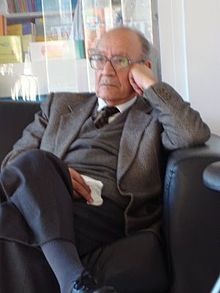Moustafa Safouan

Moustafa or Moustapha Safouan (
psychoanalyst
.
Life
Born in
Cambridge University in the aftermath of the war, he went to Paris to study philosophy in 1946. After entering analysis with Marc Schlumberger, he underwent a training analysis with Jacques Lacan in 1949. He attended Lacan's seminars in the early 1950s, though was forced to stay in Egypt for several years after Nasser came to power. Returning to France in 1959, he was sent by the Lacanian Société Française as a training analyst to Strasbourg.[1]
His book Why are the Arabs Not Free argues that Arabic culture and politics are held back by the lack of regard given to vernacular Arabics.
Safouan died on 7 November 2020. He was 99 years old.[2]
Works
- Le structuralisme en psychanalyse, 1968
- Études sur l'Œdipe: introduction à une théorie du sujet, 1974
- La sexualité féminine dans la doctrine freudienne, 1976
- L'échec du principe du plaisir, 1979. Translated by Martin Thom as Pleasure and being: hedonism, from a psychoanalytic point of view, 1983.
- Jacques Lacan et la question de la formation des analystes, 1983. Translated by Jacqueline Rose as Jacques Lacan and the question of psychoanalytic training, 1999
- La parole ou la mort: comment une société humaine est-elle possible?, 1993. Translated by Martin Thom, with an introduction by Colin MacCabe, as Speech or death? Language as social order: a psychoanalytic study, 2002.
- Four lessons of psychoanalysis, 2004
- Why are the Arabs not Free? the politics of writing, 2007
- La Civilisation Post-oedipidienne, 2017
References
- ^ Interview of Moustapha Safouan by Colin MacCabe, www.zamyn.org. Accessed 23 April 2012
- ^ وداعا مصطفى صفوان... لاكان العرب (in Arabic)
External links
- Moustapha Safouan, On the Formation of the Psychoanalyst, November 2003
- Moustapha Safouan, Questions Concerning Feminine Sexuality, 16 October 2004
